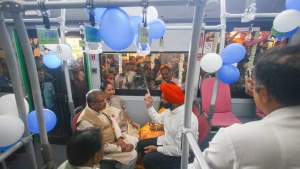New Delhi – In a significant step towards enhancing urban mobility and reducing pollution, the Delhi government launched 400 DEVI electric buses under the Delhi Vehicle Interconnector (DEVI) scheme. This initiative marks a major advancement in the Capital’s public transportation infrastructure, with DEVI electric buses now joining the city’s growing fleet of environmentally friendly public transport options.
Triple-Engine Government Powers DEVI Electric Buses Launch
Chief Minister Rekha Gupta inaugurated the DEVI electric buses at a ceremony held at Kushak Nallah Depot in Seva Nagar, New Delhi on Friday. During the event, she emphasized the collaborative effort behind this achievement.

“The Central government, the Delhi government, and local bodies are working as one team — this is the true strength of a ‘triple-engine’ government. We are united in our commitment to transform an unorganised Delhi into a better city. Today is a proud moment for all of us as we launch 400 new DEVI electric buses on Delhi’s streets,” said CM Gupta.
The launch ceremony was attended by several prominent dignitaries including Union Education Minister Dharmendra Pradhan, Union Minister of State for Road Transport Harsh Malhotra, and Delhi ministers Pravesh Sahib Singh, Ashish Sood, Manjinder Singh Sirsa, and Dr. Pankaj Kumar Singh, among others.
Also Read: Delhi Classroom Corruption Case: Shocking Rs. 2,000-Crore Scam Exposed
This collaborative approach between different levels of government demonstrates how the DEVI electric buses project has received support from multiple administrative bodies, ensuring streamlined implementation and operation.
Addressing Last-Mile Connectivity Challenges with DEVI Electric Buses


One of the primary objectives behind introducing DEVI electric buses is to tackle the persistent issue of last-mile connectivity in Delhi. Chief Minister Gupta highlighted this aspect during her address at the launch event.
“DEVI electric buses are a major step towards addressing the challenge of last-mile connectivity in the Capital,” remarked the Chief Minister, underscoring how these new vehicles will help bridge the gap between major transit hubs and residential areas.
Last-mile connectivity has been a longstanding challenge for Delhi’s public transportation system. The introduction of DEVI electric buses is expected to significantly improve accessibility for residents who previously had to rely on informal transport options or private vehicles to complete their journeys from metro stations or bus terminals to their final destinations.
The DEVI electric buses are designed to operate on shorter routes that connect residential areas with major transit hubs, shopping centers, and business districts, thereby creating a more integrated public transportation network across the city.
Ambitious Expansion Plans for DEVI Electric Buses
The current launch of 400 DEVI electric buses represents just the beginning of a much larger initiative. During the event, Chief Minister Gupta announced ambitious plans for expanding the fleet of electric buses in the Capital.
“The city will get 2,080 e-buses by the end of this year,” the CM asserted, signaling the government’s commitment to rapidly scaling up the presence of DEVI electric buses on Delhi’s roads.
This phased introduction of DEVI electric buses aligns with Delhi’s broader vision of transitioning to cleaner public transportation options. The substantial number of planned vehicles indicates the government’s serious commitment to revolutionizing the city’s public transport infrastructure while simultaneously addressing environmental concerns.
Environmental Impact of DEVI Electric Buses
The introduction of DEVI electric buses is part of Delhi’s multi-pronged strategy to combat air pollution, a persistent problem that has plagued the Capital for decades. During her address, Chief Minister Gupta emphasized the environmental rationale behind the initiative.
“45% of pollution is caused by vehicular emissions,” Gupta noted, highlighting the significant contribution of transportation to Delhi’s air quality issues. The DEVI electric buses, being zero-emission vehicles, will help reduce the carbon footprint of the city’s public transportation system.
Each DEVI electric bus that replaces a conventional diesel bus can prevent several tons of greenhouse gas emissions annually. With 400 DEVI electric buses now operational and plans for over 2,000 by year’s end, the cumulative environmental benefit could be substantial.
Beyond the direct environmental impact of DEVI electric buses themselves, the Chief Minister also outlined plans to encourage private vehicle owners to make the switch to electric options.

“The solution cannot only rely on public transport, but private vehicles must also be converted into electric vehicles. To encourage this shift, the Delhi government will soon introduce a new EV policy with attractive rebates and incentives for private vehicle owners,” announced Gupta.
This holistic approach demonstrates how the DEVI electric buses initiative is part of a broader strategy to electrify transportation across the Capital, targeting both public and private vehicles to maximize environmental benefits.
From Mohalla Buses to DEVI Electric Buses: A Rebranding Story
The current DEVI electric buses initiative has an interesting political backstory. Last year, the previous Aam Aadmi Party government had launched a trial program known as “Mohalla buses” to improve local connectivity. After the BJP came to power in February 2025, the program was rebranded as the DEVI electric buses scheme.
Explaining the significance of the new name, Chief Minister Gupta said, “Delhi has always been blessed with the divine grace of Maa Durga. Despite many disasters and challenges, this city has always stood resilient and continued to grow. It is in the honor of this spirit of faith and strength that we have named these new electric buses DEVI.”
The rebranding of the initiative as DEVI electric buses adds a cultural dimension to the project, connecting it with deeply held religious sentiments while maintaining its core purpose of enhancing urban mobility.
Advanced Features of DEVI Electric Buses
The newly launched DEVI electric buses come equipped with several state-of-the-art features designed to enhance passenger safety, convenience, and accessibility. Each bus is fitted with CCTV cameras for security monitoring, ensuring a safe travel environment for all passengers.
Additionally, the DEVI electric buses feature a live tracking system that enables both operators and passengers to monitor the location of vehicles in real-time. This functionality is particularly useful for commuters who can now better plan their journeys and anticipate arrival times more accurately.
Safety has been a key consideration in the design of these DEVI electric buses, with each vehicle equipped with panic buttons that passengers can use in emergency situations. This feature addresses growing concerns about passenger safety in public transportation.
The DEVI electric buses have also been designed with inclusivity in mind, featuring facilities specifically created to accommodate differently-abled passengers. These include wheelchair ramps, dedicated seating spaces, and accessible stop-request buttons, ensuring that public transportation becomes more accessible to all segments of Delhi’s population.
Impact on Delhi’s Transportation Landscape
The introduction of DEVI electric buses represents a significant milestone in Delhi’s journey towards developing a more sustainable, efficient, and inclusive transportation ecosystem. As these buses become integrated into the existing transportation network, several positive outcomes are anticipated.
First, the DEVI electric buses are expected to reduce the dependence on private vehicles for short-distance travel, potentially alleviating traffic congestion in many parts of the city. By providing reliable last-mile connectivity options, these buses make public transportation a more viable alternative to private vehicles.
Second, the environmental benefits of DEVI electric buses will contribute to improved air quality in the Capital, which has long struggled with dangerous levels of pollution. The zero-emission nature of these vehicles aligns perfectly with global efforts to combat climate change and create more sustainable urban environments.
Finally, the DEVI electric buses initiative demonstrates how political will, when combined with technological innovation, can address longstanding urban challenges. The triple-engine approach highlighted by Chief Minister Gupta shows that collaborative governance can yield tangible improvements in public services.
Closing Remarks
The launch of 400 new electric buses marks a significant advancement in Delhi’s public transportation infrastructure. With plans to expand the fleet to over 2,000 buses by the end of the year, this initiative promises to revolutionize urban mobility in the Capital while simultaneously addressing environmental concerns.
As Delhi continues its journey towards becoming a greener, more connected city, the newly launched electric buses will play a crucial role in shaping the future of transportation in India’s capital. By addressing last-mile connectivity challenges, embracing clean energy, and incorporating advanced safety features, these buses represent not just a mode of transport but a vision for sustainable urban development.

